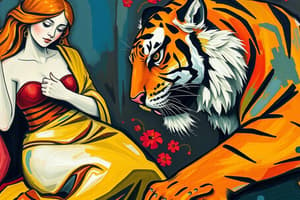Podcast
Questions and Answers
Which of the following works by Michelangelo is NOT located in the Sistine Chapel?
Which of the following works by Michelangelo is NOT located in the Sistine Chapel?
- The Dying Slave (correct)
- The Last Judgement
- The Ceiling of the Sistine Chapel
- Moses
What is the name of the famous work by Michelangelo where he depicted statues of dusk, dawn, day, and night?
What is the name of the famous work by Michelangelo where he depicted statues of dusk, dawn, day, and night?
- The Dying Slave
- The Atlas Slave
- The Last Judgement
- The statues of the New Sacristy (correct)
What is the name of the famous library in Florence that showcases Michelangelo's pioneering mannerist architecture?
What is the name of the famous library in Florence that showcases Michelangelo's pioneering mannerist architecture?
- The Laurentian Library (correct)
- The Medici Library
- The Vatican Library
- The Uffizi Gallery
Who collaborated with Giorgione on numerous paintings, and their styles are often difficult to distinguish?
Who collaborated with Giorgione on numerous paintings, and their styles are often difficult to distinguish?
What is the name of the famous work by Michelangelo that took him from 1508 to 1512 to complete?
What is the name of the famous work by Michelangelo that took him from 1508 to 1512 to complete?
Which of the following is NOT a characteristic of the Venetian School of painting?
Which of the following is NOT a characteristic of the Venetian School of painting?
What is the name of the famous work by Michelangelo that he worked on from 1534 to 1541?
What is the name of the famous work by Michelangelo that he worked on from 1534 to 1541?
What is the name of the famous work by Michelangelo that is located in St Peter's Basilica, Rome?
What is the name of the famous work by Michelangelo that is located in St Peter's Basilica, Rome?
Which of the following is a characteristic of Titian's painting style?
Which of the following is a characteristic of Titian's painting style?
What is the name of the famous work by Michelangelo that is located in the Louvre?
What is the name of the famous work by Michelangelo that is located in the Louvre?
Flashcards
High Renaissance Painting
High Renaissance Painting
Culmination of painting advances: linear perspective, realism, light/dark manipulation.
Michelangelo
Michelangelo
Italian sculptor, painter, architect, and poet; Renaissance man.
Pietà
Pietà
A sculpture by Michelangelo, located in St Peter's Basilica.
Ceiling of the Sistine Chapel
Ceiling of the Sistine Chapel
Signup and view all the flashcards
Leonardo da Vinci
Leonardo da Vinci
Signup and view all the flashcards
Raphael
Raphael
Signup and view all the flashcards
Giorgione's style
Giorgione's style
Signup and view all the flashcards
Titian's contribution
Titian's contribution
Signup and view all the flashcards
Venetian religious style
Venetian religious style
Signup and view all the flashcards
Study Notes
High Renaissance Painting
- The High Renaissance of painting was the culmination of various advances in painting technique, including linear perspective, realistic depiction of physical and psychological features, and manipulation of light and darkness.
- The style was characterized by total compositional order, balance, and harmony, with individual parts having a complex but balanced relationship to the whole.
- The paintings in the Vatican by Michelangelo and Raphael represent the culmination of High Renaissance style in painting.
Michelangelo
- Michelangelo was an Italian sculptor, painter, architect, and poet of the High Renaissance.
- He was born in the Republic of Florence and was inspired by models from classical antiquity.
- Michelangelo's creative abilities and mastery in a range of art arenas define him as an archetypal Renaissance man.
- He is one of the best-documented artists of the 16th century, with a large volume of surviving correspondence, sketches, and reminiscences.
Works by Michelangelo
- Pietà, St Peter's Basilica (1498–1499)
- David, Galleria dell’Accademia (1504)
- The Doni Tondo (1504–1506)
- Ceiling of the Sistine Chapel (1508–1512)
- Dying Slave, Louvre (1513-1516)
- Moses, Saint Peter’s Basilica (1513–1515)
- Atlas Slave (1534)
- The statues of dusk and dawn, day, and night, New Sacristy, (1525)
- The Last Judgement, Sistine Chapel (1534-1541)
- St Peter's Basilica, Rome (1546–1564) (plan and dome)
- The Laurentian Library, Florence (1550s) - pioneering mannerist
- Rondanini Pietà, Castello Sforzesco in Milan (1552)
Leonardo da Vinci
- Leonardo da Vinci was an Italian polymath of the High Renaissance who was active as a painter, draughtsman, engineer, scientist, theorist, sculptor, and architect.
- He is known for his notebooks, which contain drawings and notes on various subjects, including anatomy, astronomy, botany, cartography, painting, and paleontology.
- His pyramidal composition for subjects of the Holy Family is a notable example of his work.
Raphael
- Raphael's paintings in the Vatican, such as The School of Athens (1511) and Parnassus (1511), represent the culmination of High Renaissance style in painting.
- His works are characterized by serene mood and luminous colors.
- Triumph of Galatea (1512) is his only major classical mythological subject.
- Portrait of Pope Julius II (c. 1512) and Pope Leo X with two cardinals (1519) are notable examples of his portraits.
- Transfiguration (1520) is an unfinished work.
16th century Venetian School
- Giorgione and Titian were both apprentices at Bellini's workshop and collaborated on numerous paintings.
- Giorgione's idyllic Arcadian scenes, such as Three Philosophers, influenced his master Bellini and Titian.
- Titian's emphasis on nature as a setting was a major contribution of the Venetian School.
- His bold new composition for traditional religious subjects, such as the Pesaro Madonna (1519–1528), became a hallmark of the Venetian style.
Studying That Suits You
Use AI to generate personalized quizzes and flashcards to suit your learning preferences.



